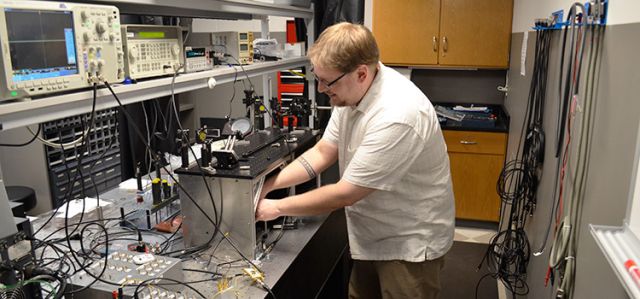Document Type
Article
Publication Date
11-1993
Publication Source
Optical Engineering
Abstract
A 2.09-μm ladar system is built to compare coherent to incoherent detection. The 2.09-μm wavelength is of interest because of its high atmospheric transmission and because it is eyesafe. The 2.09-μm system presented is capable of either a coherent or incoherent operational mode, is tunable in a small region around 2.09 μm, and is being used to look at the statistical nature of the ladar return pulses for typical glint and speckle targets. To compare coherent to incoherent detection the probability of detection is investigated as the primary performance criterion of interest. The probability of detection is dependent on both the probability of false alarm and the probability density function, representing the signal current output from the detector. These probability distributions are different for each detection technique and for each type of target. Furthermore, the probability of detection and the probability of false alarm are both functions of the dominating noise source(s) in the system. A description of the theoretical expectations of this system along with the setup of the ladar system and how it is being used to collect data for both coherent and incoherent detection is presented.
Inclusive pages
2681-2689
ISBN/ISSN
0091-3286
Document Version
Published Version
Copyright
Copyright © 1993, Society of Photo Optical Instrumentation Engineers (SPIE)
Publisher
Society of Photo Optical Instrumentation Engineers
Volume
32
Issue
11
Peer Reviewed
yes
Keywords
acquisition, tracking, pointing, coherent detection, incoherent detection, eye safety, solid state ladar
eCommons Citation
Overbeck, Jay A.; Mark, Martin B.; McCraken, Scott H.; McManamon, Paul F.; and Duncan, Bradley D., "Coherent Versus Incoherent Ladar Detection at 2.09 μm" (1993). Electro-Optics and Photonics Faculty Publications. 8.
https://ecommons.udayton.edu/eop_fac_pub/8




Comments
Paper is made available for download with permission of the author and in compliance with publisher policies on self-archiving. Permission documentation is on file.
One print or electronic copy may be made for personal use only. Systematic reproduction and distribution, duplication of any material in this paper for a fee or for commercial purposes, or modification of the content of the paper are prohibited.